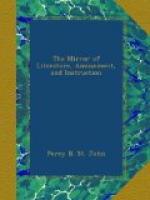The battle-pieces, and head and tail-cuts, well bespeak the ups and downs and bursts of the Revolution. They are as plentiful in this volume, as the balls were about Paris in La Grande Semaine.
* * * * *
TIME’S TELESCOPE FOR 1832
Is, as usual, a multifarious volume, and abounds with reading that must please all tastes. It has, moreover, to meet the exigencies of the day, a pretty sprinkling of cuts and plates, respecting the number of which we do not quarrel; in the choice of some of them we must, however, dissent from the editor. The Astronomical portion, by Mr. Barker, is unusually copious, and the cometary plates are well executed. We quote a passage:
On the probability of a concussion of a Comet with the earth.
It has been stated that the comet of 1770, passed through the system of the planet Jupiter, without in the slightest degree affecting the motions of either the primary or his satellites; also, that it passed sufficiently near our planet to have shortened the length of the year had its mass been equal to that of the earth. No effect whatever was produced, from whence it may be concluded, that the neighbourhood of a comet is not of sufficient importance to excite any alarming apprehensions for the safety of the habitation of man.
Most of the calculations that have been made respecting the effect of the proximity of a comet to our earth have proceeded on erroneous principles,—over-rating the quantity of matter in comets, and losing sight of their great velocity when in this part of the system. For a comet to produce any direful effect, it ought to contain not merely a considerable quantity of matter, but also ought to be vertical and stationary to the earth’s surface for several hours; instead of which, we have sufficient reason to believe that though vast in volume, comets contain but little matter in proportion, consequently, their attractive energy would be inconsiderable; also their velocity would, in a very short period, carry them beyond the limit of exerting any influence on the waters of the globe. Of course, this general statement would be modified by the rate and direction of a comet’s motion, and also the earth’s rotation.




